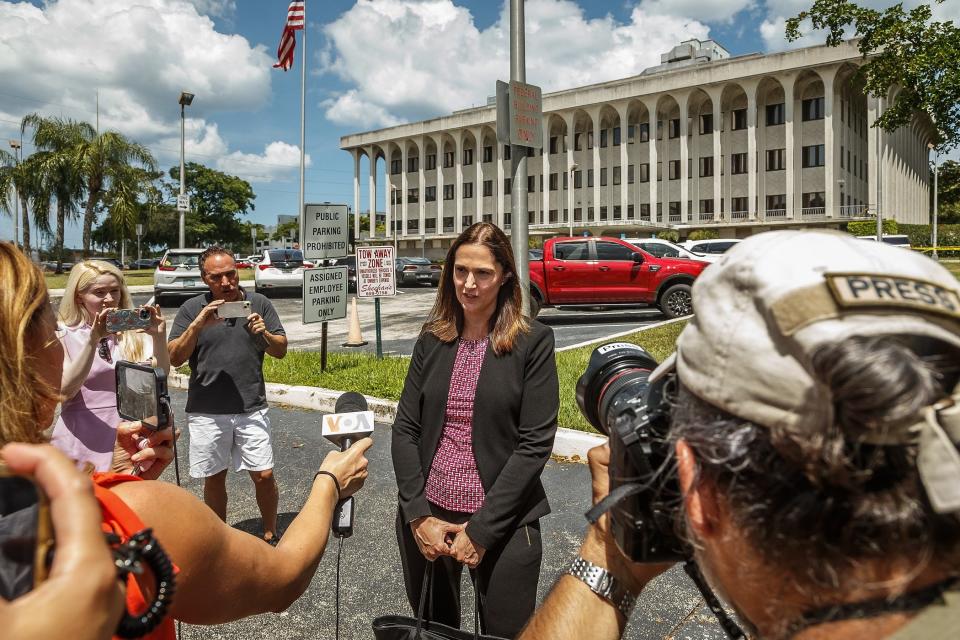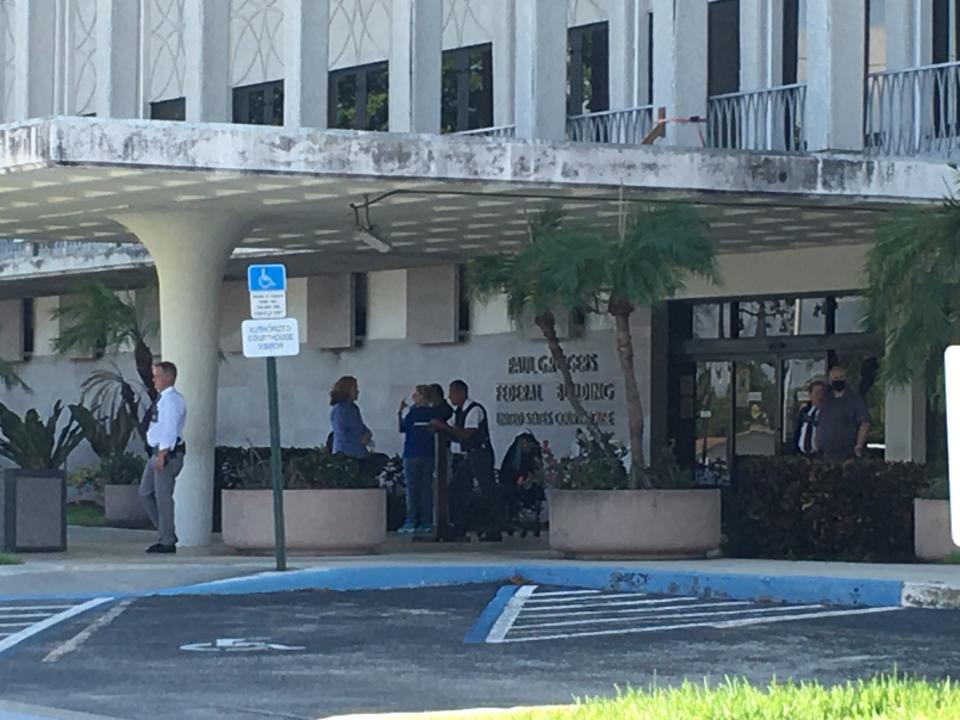Mar-a-Lago search hearing update: Hearing ends; Judge says parts of search affidavit can be released
Support local journalism. Consider subscribing to your local newspaper. See our current offers.
News organizations including The Palm Beach Post, part of the USA TODAY Network, appeared before magistrate judge, Bruce Reinhart, in West Palm Beach Thursday to push for the release of a document that would reveal why the U.S. Justice Department asked to search ex-President Donald Trump’s Mar-a-Lago estate in Palm Beach.
More on search affidavit: Though Mar-a-Lago warrant released, Palm Beach Post asking court for entire documents
More on Mar-a-Lago search: Donald Trump knows what FBI agents took from Mar-a-Lago and why they took it, experts say
Editorial: For justice's sake, let ex-President Trump's Mar-a-Lago investigation proceed unhindered
Judge: Some portions of Mar-a-Lago search affidavit can be made public

Attorneys for the U.S. Department of Justice and various media agencies, including The Palm Beach Post, took turns arguing before a federal judge magistrate about whether the affidavit for the search of former President Donald Trump's Palm Beach home should remain sealed.
U.S. Magistrate Judge Bruce Reinhart weighed the concerns of the government that releasing the affidavit could jeopardize their investigation against the concerns of the media, whose attorneys questioned the legality of a blanket restriction.
After an hour and a half long hearing, Reinhart agreed with the media that portions of the affidavit should be unsealed.
I’m at the U.S. District Court in West Palm Beach where news organizations, like @pbpost, will appear before magistrate judge, Bruce Reinhart, to push for the release of the affidavit for the Mar-a-Lago search. pic.twitter.com/dlmfnrP8xz
— Stephany Matat (@stephanymatat) August 18, 2022
“We the people are the ultimate stakeholders," said Chuck Tobin, a lawyer who spoke on behalf of the media organizations. Transparency is paramount in a case as unprecedented as this one, he said, and "you can’t trust what you cannot see.”
Jay Bratt, who spoke to the judge on behalf of the government, cautioned that so much of the affidavit will need to be redacted, only gibberish will remain.
"It really serves no purpose," the attorney said. "It does not edify the public in any meaningful way.”
Tobin countered that it isn't up to the government to decide what is and is not of interest to the general public.
Bratt argued that "amateur sleuths on the internet" may be able to figure out the names of people referenced in the affidavit, putting their safety at risk and potentially dissuading future witnesses from cooperating with the investigation.
He also said that releasing a redacted version sets a difficult precedent for the government to uphold. It'll take time and resources to make those redactions, he said — resources pulled away from the actual investigation.
Tobin acknowledged that while it may be a considerable undertaking to redact the affidavit, "that doesn’t overcome the public’s right to these materials.”
The lawyers representing the media reminded Reinhart time and again over the course of the hearing that the judge is "the gatekeeper" between the government and the public. Any proposed redactions must be looked at critically, Tobin said.
"This is going to be a considerate, careful process," Reinhart said at the close of the proceeding.
The government will file its proposed redactions on Aug. 25. If the judge finds them satisfactory, he'll issue an order to move forward with the redactions. If he doesn't, he'll either hold another hearing with the government or issue his own proposed redactions, Reinhart said.
If there's disagreement between the government and Reinhart, "obviously I win," the judge said.
The people in the courtroom, mostly journalists, laughed. None were allowed to leave the courtroom until the hearing was over, and bailiffs imposed a strict rule preventing reporters from breaking news about the proceedings while the court was in session.
A bailiff confiscated the phone of a journalist after it appeared that she broke the rules.
Reporters can't leave courtroom during hearing on Mar-a-Lago search
Reporters covering the hearing on the search of Mar-a-Lago cannot leave the courtroom once the hearing begins, according to federal officials.
The decision will limit the way news organizations can provide updates on the proceeding. Federal courts prohibit the use of cameras during hearings and slimit the use of other electronic devices.
The hearing began at about 1 p.m. in downtown West Palm Beach, with federal attorneys arguing that the release of the probable-cause affidavit would impede the government's investigation.
Scene outside federal courthouse where hearing on releasing more documents from Mar-a-Lago search will start soon
Can you watch today's hearing livestream or on TV? Can public attend?

The 1 p.m. hearing at U.S. District court in West Palm Beach is open to the public. It will not be broadcast on TV or online.
More on Trump'Mar-a-Lago search: Since Trump won the presidency, Mar-a-Lago was always a national security red flag
Rules in federal courthouses are strict. No cell phones are allowed. Cameras are also prohibited. That’s why news organizations often hire sketch artists for high-profile trials.
Why is the media requesting more documents from Trump's Mar-a-Lago search?
News organizations have already reported many details about key information prosecutors and FBI agents gathered that led to the search of Mar-a-Lago, through the search warrant and "inventory list," but they want more, such as the probable cause affidavit (PC), which would provide much more information.
But PCs are rarely made public before an indictment is made because of fear of jeopardizing an investigation.
Attorneys for the media companies, including The Palm Beach Post, are expected to acknowledge the U.S. Justice Department’s concerns that the release of the entire probable cause affidavit could “irreparably harm” its ongoing investigation, said attorney Martin Reeder, who represents The Palm Beach Post.

Media attorneys pushed back against federal prosecutors' claims that the entire document should be kept from the public.
Rather than sealing the entire document, as prosecutors want, they will ask U.S. Magistrate Judge Bruce Reinhart to release as much information as possible.
“We want as much as can be disclosed,” Reeder said. “Anything that doesn’t damage their investigation.”
This article originally appeared on Palm Beach Post: Judge Bruce Reinhart: Mar-a-Lago search affidavit parts can be public

